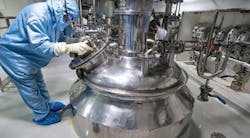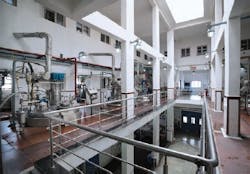Neuland Lab’s core business and operational expertise for more than 30 years has been the manufacturing of Active Pharmaceutical Ingredients (APIs) for the generic market as well as APIs for custom manufacturing. During that time, Neuland has become a reliable source in the pharmaceutical industry, boasting more than 400 DMFs worldwide, with 45 of those filed with the U.S. FDA.
NON-TRADITIONAL PROJECT MANAGEMENT
Contributing to its success is Neuland’s custom project management system known as “Neuland GuarD.” Neuland’s project planning is done using the principles of Critical Chain Project Management (CCPM). Pioneered by business management guru Eliyahu Moshe Goldratt in 1997, CCPM was developed in order to overcome the common delays and excess costs that plague traditional project management. Oftentimes in traditional project planning, excess time is built into the plan “just in case.” This “safety-time” tends to encourage procrastination, delays and multi-tasking. CCPM recommends that task estimates are cut to half the length of a “normal” duration.
Additionally, “buffers” are allocated to manage the impact of variation and uncertainty around projects. Resources are encouraged to focus on the task at hand to complete it and hand it off to the next person or group, with the objective of eliminating non-productive multitasking.
Upon receiving an order or contract from the client, Neuland plans by dividing the project into several meaningful tasks. Each project is assigned a PhD-level team leader and all the tasks are allocated to specific task managers with mapping to specific resources (lab space, chemicals, financial budget, etc.) Using the principles of CCPM, the buffers are allocated at the end of the project, rather than the end of each task, which encourages each task manager to complete their tasks as soon as possible.
Neuland’s GuarD allows Neuland project members as well as clients to log in at any time to check the current status of their project, promising 100 percent transparency.
SHARP STRATEGIC FOCUS
Gas Chromatograph in R&D.
As global pharma companies continue to look for ways to reduce both manufacturing and infrastructure costs, outsourcing to countries such as India and China is on the rise. In fact, Research and Markets analysts forecasted the API market in India to grow at a CAGR of 10.76 percent over the period 2014-2019.However, several incidents in recent years have created an atmosphere of mistrust of drug products from India, particularly in regards to drug quality. Neuland Labs looks to separate itself from this pack. With 99 percent of its products going to the most highly regulated pharmaceutical markets in the world — Europe, U.S. and Japan — regulatory compliance is imperative if Neuland wants to compete on these high-stakes stages.
“In terms of quality, we are a non-compromising organization,” says Pradeep Kumar Jain, head of manufacturing operations at Neuland Labs. True to its word, Neuland Labs has not received a single critical observation from any regulatory or customer audit.
Neuland describes its company and all employees as “compliance-obsessed,” continuously monitoring adherence to cGMP guidelines [ICH (Q7)] as well as the various requirements of FDA, ICH, EMEA and EDQM at both manufacturing facilities.
“Our strategic focus is faster delivery and consistent quality for our customers, and we are constantly looking for ways to improve both,” says Pradeep.
API delivery, of course, is critical to the drug-development timeline. Delays in API delivery can lead to missed regulatory deadlines and serious financial repercussions.
Neuland’s Block I Intermediate reactor area.
“To make the delivery as per customer demand, we continuously monitor due date performance (DDP) product-wise and ‘Black’ orders weekly. This monitoring directs our efforts to meet the customer demand. Additionally, we have a dedicated team of engineers working continuously to reduce the touch time of products using new technology implementation in operations,” says Pradeep.Neuland monitors the age of customer orders using a color system. Any customer order which crosses the due date of delivery is labeled a “Black” order. Efforts are made to expedite the process according to category color.
STAYING CONSISTENT
In addition to touch times, Pradeep notes that when discussing quality, customers are more focused — and less lenient — regarding particle size distribution (PSD). As drug potencies increase, and drug delivery methods evolve, this trend is not surprising.
“At Neuland, we are able to control particle size within a very narrow range of 1 micron. This is important because if you are not able to supply customers within that narrow range of particle size distribution, it creates too much variation. Consistency is very important. If we supply consistently, customers do not need to alter the parameters of their processes or equipment to achieve their target PSD (results),” notes Pradeep.
To control the particle size distribution, Neuland Labs uses air jet mills that offer advanced and precise control over different parameters of micronization. These controls are the key to consistency in PSD.
RUNNING A TIGHT SHIP
Consistent employees are also key to quality outputs. Neuland’s training is geared towards strict attention to process procedure, which serves to minimize opportunities for human error.
“We control our quality through strict practices and constant testing. All employees are trained in the latest cGMP practices. The detailed Batch Manufacturing Records (BMS) allow no opportunity to deviate from procedure. Strict monitoring systems, such as Electronic Data logging and round-the-clock-QA personnel on the floor, are in place to immediately catch deviations,” says Pradeep.
All operators, supervisors and management undergo in-house training as well as training with external consultants. Neuland has U.S. training consultants on its board who visit regularly in order to audit the facilities, in addition to the internal audits performed by Neuland’s own QA department.
Neuland’s Block II Miller Sieving Room.
Neuland continuously invests in facility upgrades. Notable recent upgrades include 20M INR (approximately $300,000 U.S.) invested in upgrading a final powder processing area and 120M INR (approximately $1.8M U.S.) invested in upgrading its effluent treatment plant. About four years ago, Neuland created a dedicated block for peptide chemistry — a provider offering that Neuland considers “a rare strength” in India. As these low-volume, high-value products find increasing use as therapeutics, diagnostics, and for antibody production, Neuland is confident this investment will pay off in the near future.Neuland Labs continues to bring value to its customers by being unwilling to compromise on any facet of quality. At the end of the day, “production done without GMP compliance and quality in mind does not have any value to Neuland Labs or our customers,” says Pradeep.
About the Author
Karen P. Langhauser
Chief Content Director, Pharma Manufacturing
Karen currently serves as Pharma Manufacturing's chief content director.
Now having dedicated her entire career to b2b journalism, Karen got her start writing for Food Manufacturing magazine. She made the decision to trade food for drugs in 2013, when she joined Putman Media as the digital content manager for Pharma Manufacturing, later taking the helm on the brand in 2016.
As an award-winning journalist with 20+ years experience writing in the manufacturing space, Karen passionately believes that b2b content does not have to suck. As the content director, her ongoing mission has been to keep Pharma Manufacturing's editorial look, tone and content fresh and accessible.
Karen graduated with honors from Bucknell University, where she majored in English and played Division 1 softball for the Bison. Happily living in NJ's famed Asbury Park, Karen is a retired Garden State Rollergirl, known to the roller derby community as the 'Predator-in-Chief.'




